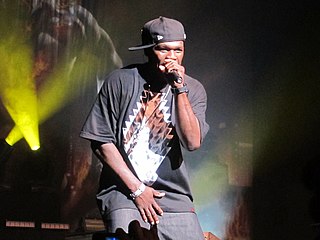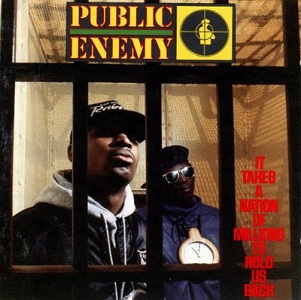
Public Enemy is an American hip hop group formed by Chuck D and Flavor Flav on Long Island, New York, in 1985. The group rose to prominence for their political messages including subjects such as American racism and the American media. Their debut album, Yo! Bum Rush the Show, was released in 1987 to critical acclaim, and their second album, It Takes a Nation of Millions to Hold Us Back (1988), was the first hip hop album to top The Village Voice's Pazz & Jop critics' poll. Their next three albums, Fear of a Black Planet (1990), Apocalypse 91... The Enemy Strikes Black (1991) and Muse Sick-n-Hour Mess Age (1994), were also well received. The group has since released twelve more studio albums, including the soundtrack to the 1998 sports-drama film He Got Game and a collaborative album with Paris, Rebirth of a Nation (2006).

Rapping is an artistic form of vocal delivery and emotive expression that incorporates "rhyme, rhythmic speech, and [commonly] street vernacular". It is usually performed over a backing beat or musical accompaniment. The components of rap include "content", "flow", and "delivery". Rap differs from spoken-word poetry in that it is usually performed off-time to musical accompaniment. It also differs from singing, which varies in pitch and does not always include words. Because they do not rely on pitch inflection, some rap artists may play with timbre or other vocal qualities. Rap is a primary ingredient of hip hop music, and so commonly associated with the genre that it is sometimes called "rap music".
The new school of hip hop was a movement in hip hop music, beginning in 1983–84 with the early records of Run–D.M.C., Whodini, and LL Cool J. Predominantly from Queens and Brooklyn, it was characterized by Drum Machine-led minimalism, often tinged with elements of Rock; rapped taunts, boasts, and socio-political commentary; and aggressive, self-assertive delivery. In song and image, its artists projected a tough, cool, street B-boy attitude. These elements contrasted sharply with Funk and Disco, Novelty hits, live bands, synthesizers, and party rhymes of artists prevalent in the early 1980s. Compared to their older hip hop counterparts, new school artists crafted more cohesive LPs and shorter songs more amenable to airplay. By 1986, their releases began to establish hip hop in the mainstream.

Trevor George Smith Jr., known professionally as Busta Rhymes, is an American rapper and actor. Chuck D of Public Enemy gave him the moniker Busta Rhymes, after NFL and CFL wide receiver George "Buster" Rhymes. He has received 12 Grammy Award nominations for his work, making him one of the most-nominated artists without winning.
This is a list of notable events in music that took place in 1999.

The 40th Annual Grammy Awards were held on February 25, 1998, at Radio City Music Hall, New York City. They recognized accomplishments by musicians from the previous year. This event is best known for Ol' Dirty Bastard interrupting Shawn Colvin's speech for Song of the Year.
Leaders of the New School was an American hip hop group based in Long Island, New York.
The 39th Annual Grammy Awards were held on February 26, 1997, at Madison Square Garden, New York City. They recognized accomplishments by musicians from the previous year. Babyface was the night's biggest winner, with 3 awards. Celine Dion, Toni Braxton, Sheryl Crow, and The Fugees won two awards. Celine Dion for "Best Pop Album" and "Album of the Year" and Toni Braxton for "Best Female R&B Vocal Performance" and "Best Female Pop Vocal Performance". The show was hosted by Ellen Degeneres who also performed the opening with Shawn Colvin, Bonnie Rait, and Chaka Khan.

Fear of a Black Planet is the third studio album by American hip hop group Public Enemy. It was released on April 10, 1990, by Def Jam Recordings and Columbia Records, and produced by the group's production team The Bomb Squad, who expanded on the sample-layered sound of Public Enemy's previous album, It Takes a Nation of Millions to Hold Us Back (1988). Having fulfilled their initial creative ambitions with that album, the group aspired to create what lead rapper Chuck D called "a deep, complex album". Their songwriting was partly inspired by the controversy surrounding member Professor Griff's anti-Semitic public comments and his consequent dismissal from the group in 1989.
The Bomb Squad was an American hip hop production team known for their work with hip hop group Public Enemy.
In poetry, internal rhyme, or middle rhyme, is rhyme that occurs within a single line of verse, or between internal phrases across multiple lines. By contrast, rhyme between line endings is known as end rhyme.
Mohandas Dewese, better known by his stage name Kool Moe Dee, is an American rapper, songwriter and actor. Considered one of the forerunners of the new jack swing sound in hip hop, he gained fame in the 1980s as a member of one of the pioneering groups in hip hop music, the Treacherous Three, and for his later solo career. During his career he released a total of seven studio albums, with 1994's Interlude being the last to date.

Antonio Hardy, better known by his stage name Big Daddy Kane, is an American rapper, producer and actor who began his career in 1986 as a member of the Juice Crew. He is widely regarded as one of the most influential and skilled MCs in hip hop. Rolling Stone ranked his song "Ain't No Half-Steppin'" number 25 on its list of The 50 Greatest Hip-Hop Songs of All Time, calling him "a master wordsmith of rap's late-golden age and a huge influence on a generation of MCs".

The Grammy Award for Best Rap Performance is an honor presented to recording artists for quality rap performances. It was first presented at the 31st Annual Grammy Awards in 1989 and again at the 32nd Annual Grammy Awards in 1990, after which point the award was split into two categories: Best Rap Solo Performance and Best Rap Performance by a Duo or Group. These two categories were combined again in 2012 as a result of a restructure of Grammy categories, and the reinstated Award for Best Rap Performance was presented at the 54th Grammy Awards in 2012. The restructuring was the consequence of the Recording Academy's wish to decrease the number of categories and awards and to eliminate distinctions between solo and duo or group performances.
Young Black Teenagers (YBT) was an American hip hop group from Long Island, New York that consisted of ATA, First Born, Tommy Never, Kamron, and DJ Skribble. Despite their name, none of the group's members were black.
Keith Matthew Boxley, better known as Keith Shocklee or Wizard K-Jee, is an American record producer and DJ. He was an original member of Public Enemy and the Bomb Squad. He has contributed his talent to several albums including It Takes A Nation Of Millions To Hold Us Back and Fear of a Black Planet. Shocklee also co-produced the singles "Bring the Noise” and "Fight The Power," which were included on Rolling Stone's list of the “500 Greatest Songs Of All Time.”

Dead Enz Kidz Doin' Lifetime Bidz is the second and final studio album by American hip hop group Young Black Teenagers. It was released on February 2, 1993, via Sound of Urban Listeners (SOUL)/MCA Records. Production was handled by Gary G-Wiz, Keith Shocklee, Grandmaster Flash, Kerwin "Sleek" Young, Paul Shabazz and Terminator X, with Hank Shocklee serving as executive producer. The album peaked at number 158 on the Billboard 200 in the United States.

It Takes a Nation of Millions to Hold Us Back is the second studio album by American hip hop group Public Enemy, released on June 28, 1988, by Def Jam Recordings and Columbia Records. It was recorded from 1987 to 1988 in sessions at Chung King Studios, Greene St. Recording, and Sabella Studios in New York.

"Tap the Bottle" is a song by American hip hop group Young Black Teenagers. It was released on November 24, 1992, via Sound of Urban Listeners (SOUL)/MCA Records as the lead single from YBT's second studio album Dead Enz Kidz Doin' Lifetime Bidz. Production was handled by Terminator X.

Osten S. Harvey Jr., better known by his stage name Easy Mo Bee, is an American hip hop and R&B record producer and DJ, known for his production work for artists such as Big Daddy Kane and Miles Davis, as well as his affiliation with Bad Boy Records in its early years, and his production involvement in The Notorious B.I.G.'s debut album, Ready to Die. He also produced two songs on 2Pac's album, Me Against the World.











